13:30
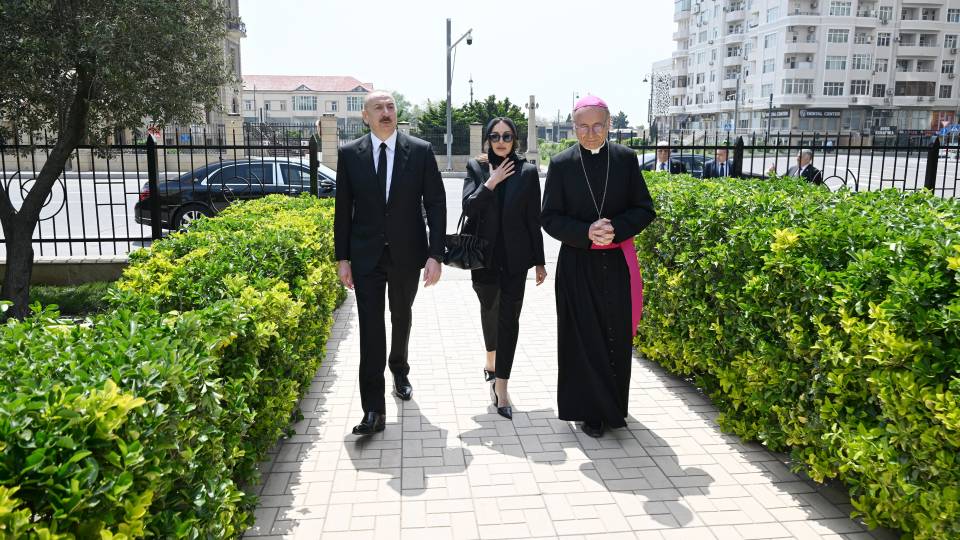
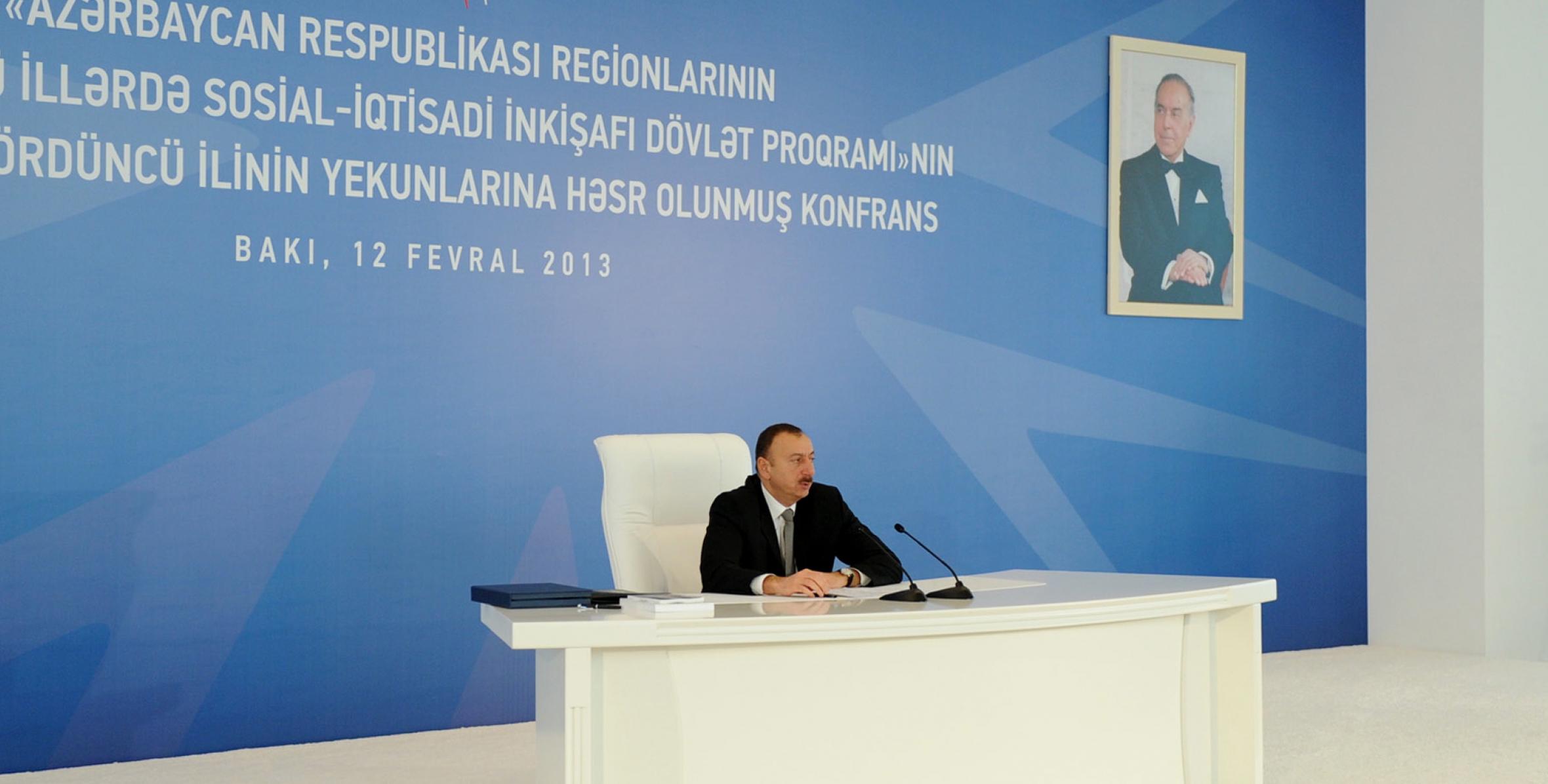
- The implementation of the second State Program will be ensured before the end of this year. Thus, a period spanning 10 years will be left behind. But it is already possible to say that the implementation of the two state programs adopted in 2004 and 2009 has played a very important role in the development of our country. If these programs had not been adopted, there could be no question about the development ongoing in the regions today. This decision taken in 2004 provided a comprehensive, sustainable and diversified development of our country.
The first program was over-fulfilled. The issues not provided for in the program in 2004 were incorporated into it in the following years. The program adopted in 2009 also underwent numerous additions, because life goes on and the country faces new challenges. While implementing these programs we launched new initiatives to address emerging issues. In short, the program is constantly updated. Thus, the suggestions and applications coming from the regions, the proposals expressed during meetings with the local population during my trips to the regions were certainly incorporated into the programs. At the same time, following the adoption of the second program in 2009, large funds for regional development were allocated from the Contingency Fund of the President. In particular, for infrastructure, transport, rehabilitation of rural roads and landscaping.
The ideas voiced today and, on the whole, the positive changes ongoing in the country suggest that the second State Program will be fully implemented by the end of this year. This program, I want to say again, will be over-fulfilled. Before the end of the year we must address all the issues contained in the State Investment Program and the State Program on the socioeconomic development of districts.
I believe that the volume of investments in the economy this year should not be less than last year. Last year investment totaled $22.1 billion. I think that the same amount should be invested this year. I believe that we will be able to reach this figure both through the state and as a result of private sector activities. And this, of course, will contribute to the successful completion of the State Program on the socioeconomic development of districts.
First of all, it is important to continue infrastructure projects. The work carried out in this direction can be evaluated positively, and it must be continued. In particular, in the foreground are issues of completing the construction of main roads and repairing and building rural roads. We can say now that the construction of rural roads has assumed large proportions in all the regions. We are implementing these projects on the basis of suggestions and requests coming from the regions. First of all, we rebuild roads in the regions with the highest population density, the roads connecting the largest number of villages. The goal is to renovate at a high level all our rural roads so that this issue is resolved.
As a result of the work on improving power supply we have carried out in recent years, we can say that the shortage of electricity is no longer experienced. In recent years we have achieved the construction of new power plants with a capacity of 1,500 megawatts. This process continues. This year, as a result of commissioning of the "Janub" power plant in Shirvan, we will obtain about 800 megawatts of new capacity. The construction of the "Shimal-2" power plant is ongoing. This is another 400 megawatts. So this will significantly strengthen our energy potential. At the same time, the construction of hydroelectric power plants has continued. Last year we opened several stations on small rivers. In parallel with the implementation of major projects, the process of creation of hydroelectric power stations, renewable and alternative energy sources is under way. Among them I can cite the recently opened Fizuli hydroelectric power plant. This station has a capacity of 25 megawatts and is a renewable source of energy.
The construction of a power station which is part of the plant for recycling household waste has already been completed in Baku, in Balakhani. There we will generate about 20 megawatts of electricity.
The construction of the Takhtakorpu water reservoir is under way, and this ambitious infrastructure project will be realized this year. Tens of thousands of hectares of land will be irrigated and, at the same time, a power station with a capacity of 25 megawatts, which is a part of the project, will be built. So we have a sufficient generating capacity.
As you know, Azerbaijan currently exports electricity to neighboring countries. But we can’t be content with the condition of transmission lines. Relevant instructions on this issue have already been given. The investment program for this year also includes the issue of upgrading transmission lines. We should pay more serious attention to this issue and improve the condition of transmission lines in a short time. Baku and the regions have a great need for that.
Work has begun on the creation of renewable energy sources. I do hope that this direction will also become very promising. Thus, we have rich deposits of oil and gas, and Azerbaijan will have no problems with internal sources, i.e. sources of energy, at least for the next 100 years. But I think it is also necessary to create renewable sources of energy, to enhance this process. First of all, this will provide us with additional financial resources. On the other hand, I think that by creating these new technologies, renewable energy technologies, "green energy" we will make our contribution to the solution of environmental problems in the world.
Of particular importance among the infrastructure projects is the process of gasification. I am sure that the instructions I issued in the past will be fulfilled and gasification in Azerbaijan will reach 90 per cent before the end of this year. Large investment projects are being implemented in this area. The process of gasification is under way in all our regions. In most districts we have to bring and will bring gasification to 100 per cent. In some mountainous regions the level may be lower. We in all our regions, in all our villages we will carry out work related to sustainable energy supplies. The population will have stable supplies of energy and gas.
A special place among the infrastructure projects is occupied by drinking water and sanitation projects. Last year, as part of the State Investment Program, major funds were channeled into this area. This year too, about 800 million manats, perhaps even more, is envisaged. And here we set the maximum goal again: in all the residential settlements, in Baku, in all our cities and villages we must implement projects to ensure sustainable supplies of clean water meeting the standards of the World Health Organization.
This work has assumed large proportions in all the regions. This is a huge problem that has haunted us at all times and I am sure it will be resolved in the coming years. I also want to note that we are implementing these projects with the potential population growth in mind, so that they could be effective at least until 2035. Thus, after this issue has been resolved, we can say that utility and infrastructure projects will be realized in all the regions.
Another group of projects that occupy an important place in the investment program are projects on land reclamation. These projects are directly linked to the development of agriculture. Our country is implementing two grand projects where perhaps the biggest volume of non-oil sector investment has been made – the Takhtakorpu and Shamkirchay water reservoir projects. As I noted earlier, the Takhtakorpu water reservoir should be put into operation this year, while Shamkirchay in two years. As a result of these two indispensible projects, tens of thousands of hectares of new land will be included in the turnover. As I said in my opening remarks, this is very important for our food security. At the same time, it will create an additional export capacity. We already have to map out our plans on conducting land treatment activities on tens of thousands of hectares of the lands which will be put into circulation as a result of these projects. Additional equipment must be purchased. We have been purchasing equipment through “Agroleasing” using the funds allocated from the state budget for several years, and this equipment is leased to the population, to farmers. We will probably have to purchase additional machinery and fertilizer, take other measures to enable farmers to effectively use the new lands that will be included in the turnover.
At the same time, there has to be a plan of comprehensive measures to provide the new irrigated lands with water and necessary equipment. I believe that this work must begin now. The necessary instructions have been given. But I think that the Ministry of Economic Development and the Ministry of Agriculture should submit more specific proposals to me in the coming months. The boundaries of irrigated lands should be determined together with the land reclamation company, so that we could be ready for the cultivation of new lands and waste no time.
The process of creation of large farms has started. As you know, I gave this instruction a few years ago. But I indicated at last year's meeting that although instructions had been given, no work was carried out. Now I believe that the work done over the past year has given an impetus to this process. About 5,000 hectares of land have already been allocated and large crop production farms established in Agjabadi and Beylagan Districts. Of course, we expect a rich harvest from these lands. I believe that there should be high yield on this land. By implementing these projects we are taking a very important step towards providing ourselves with grain. Now I will touch upon the issue of self-reliance. But before that I want to say that according to the information provided, at least 50 large crop production farms should be established so that we could provide ourselves with grain. Our intention to provide for ourselves is based on several reasons. First of all, it is the importance of food security. Issues of food security have become part of our agenda in recent years. We used to focus more on energy and transportation security before, and I can say that we have made great strides in addressing these issues.
The initiatives and projects Azerbaijan has put forward in the transport and energy sectors are providing and will continue to provide not only for our own interests, but also for the interests of the region and the continent. Azerbaijan has already become an indispensable partner in these areas. I can say that the share of Azerbaijani oil in the energy mix of some European countries is already reaching 30-40 per cent. Thus, our oil resources already provide for the energy security of some countries. The TANAP project launched on our initiative will secure the transportation of Azerbaijani gas to various countries. Thus, Azerbaijan will become an invaluable partner in matters of energy security in the gas sector too. In particular, after building the Baku-Tbilisi-Kars railway we will create a new and permanent corridor. The number of countries using this corridor will increase. During ongoing bilateral negotiations, we are already observing the interest of many countries in this project. I also want to note that this project was initiated by the will of the Azerbaijani state. Of course, as initiators of the project, we took on tremendous responsibility. I am very glad that the neighboring countries participating in this project together with us are also making efforts and contributions.
Food security is a relatively new concept. That is, it is not a new concept per se, but as a problem these issues have arisen in recent years. And there are several reasons for that. I do not want to talk much about it. In some cases, it is monopolistic trends, in others it is the drought, in others still it is the use of plants for the production of alternative fuels and changing the use of farmland. In any case, we faced this problem a few years ago. You will probably remember the implementation of contracts, i.e. the contracts relating to imports, being in question because some producing countries experienced a drought. They could not meet their own needs for grain. Of course, we came out of that situation – after all, there are no hopeless situations. But it was a signal for us. After revisiting the issues of self-sufficiency, we saw that there was very large room for development.
Of course, Azerbaijan is part of the global economy. We have long been integrated into the global economy and are committed to the principles of a market economy. But at the same time, I think that every country, especially if its natural and climatic conditions permit, should resolve issues of self-reliance with staple foods. In recent years we have done a lot of work in this direction too. I will bring to your attention some of the figures associated with this a little later.
I spoke about this at the previous meeting and want to talk about the development of agriculture again. Because I believe that very serious work still needs to be done in this area.
Specialization of our districts should be conducted. Each district has its own characteristics, its own nature and climate. These climatic conditions must be taken into account. Specialization projects should be implemented for each district. Instructions have been issued. But I do not see any results yet. I believe that specific suggestions for each district should be submitted to me in the near future. What district should produce more of which agricultural products and what additional steps we should take to do that. We usually give general instructions. For example, general instructions are given to meet domestic needs for agricultural produce by producing it in Azerbaijan, to increase export opportunities. But as regards the distribution of this production among districts, more specific suggestions should probably be provided.
I believe that the time has come for the application of new technologies in agriculture. In general, as you know, the application of new technologies, information and communication technologies has assumed large proportions in Azerbaijan. We are the regional leader in this field. We are also in leading places in overall global rankings. I think that ICT issues in agriculture are also important. These include the issue of electronic registration of farmers. This project will pursue several goals. It will increase the efficiency of subsidies and clarify the issue of boundaries of farmland. There is a great need for that. In general, we have to bring modern technology to the villages. A major project has already been launched in this area. We will lay broadband Internet lines to all our towns. This is a project worth several million manats. Due to its importance, the project is directly funded by the State Oil Fund and supervised by the Ministry of Communications and Information Technology. That is, we have to and we will bring broadband Internet to every village. It is our intent. In parallel, we need to use information technology for the development of agriculture. We have the "e-government" project. I believe that this issue should be resolved in the villages too.
As I noted earlier, last year we started to create large farms, and the results are already available. This initiative is exclusively meant to address issues of food security. Special state support has been provided in this area. And this is natural because issues of food security need to be at the forefront. But we should know that the bulk of agricultural production is provided by small farms. Of course, we are not forgetting and will not forget them. The work done in the regions over the last nine years, particularly in the agricultural and processing sectors, and the support provided were meant for small farms. So this area should always be at the center of attention.
As you know, we are taking comprehensive measures to facilitate agricultural development, ensure food security and eliminate unemployment in the regions. As you know, in the mid-1990s great leader Heydar Aliyev began radical economic reforms in the villages. Farmers were exempted from all taxes except for the land tax, and today we have preserved those benefits although about 20 years have passed and farmers are already up on their feet and have extensive opportunities. Azerbaijan has also covered a very long road. But we are leaving these benefits in force, which I think is a good policy.
Every government should support its farmers. Every government should provide subsidies. We are also doing that. The subsidies and loans we provide are quite diverse. I mentioned that preferential loans in the amount of 1 billion 200 million manats have been provided. 83 per cent of these loans were channeled into the agricultural sector of the regions. The purchase of equipment and the establishment of "Agroleasing" have been our initiatives. As regards the development of animal husbandry, breeding stock is purchased by the government. Another order was signed yesterday. The state and the government provide methodic guidelines. The Ministry of Economic Development already has a great experience in this field. Farmers are even provided with methodological advice as to what work can be done using the money. Of course, the subsidies, i.e. the material support, are provided by us, but unfortunately sometimes we can not achieve transparency in this area. The subsidies either do not reach their destination or someone embezzles them. In some cases a part of the subsidies meant for farmers disappears in the pockets of government officials. In others, the volume of production and the size of the farmland are exaggerated in order to receive more subsidies. In some cases the necessary equipment and facilities are imported from abroad at high prices. In other words, we need to ensure complete transparency in this area. The state has always supported and will continue to support the peasants. It is necessary to make sure that this support reaches the farmers to the maximum extent – by one hundred per cent.
Therefore, I think that in the coming months it is first of all necessary to re-examine the experience available in the provision of subsidies, make suggestions and, along with the positive sides, identify shortcomings. In this I am urging the farmers to submit their proposals to the Presidential Administration, the government, the Ministry of Economic Development, the Ministry of Agriculture and local executive authorities. Make your suggestions so that we know more precisely what the issues of concern are for you. I am aware that there are problems in this area and that transparency is not at the required level. These deficiencies must be rectified in a short time. Farmers should be able to receive whatever they are entitled to. Let no-one set his eyes on this money!
I want to voice some figures related to self-sufficiency. On staple foods we have achieved the following levels. Last year we provided ourselves with meat and meat products by 92 per cent and this year will provide by 95 per cent. Poultry – 88 per cent and expected to be 93 per cent by the end of this year. Eggs – 96 per cent and according to the forecast for this year will be 100 per cent. Vegetable oils – 70 per cent and will rise to 75 per cent. Butter – 50 per cent and will be only 52 per cent this year. This is a very low indicator. We need to think about that. We provide ourselves with milk and dairy products at the level of 73 per cent. By the end of this year it will be 78 per cent. Grain – 65 per cent and will be 70 per cent. As I said, by establishing 50 large farms we will reach a level of 100 per cent. Grapes – 94 per cent and will be 96 per cent. Potato production – almost 100 per cent and will remain at that level. Melons – 100 per cent. This year there will be greater export opportunities, the level of production will be 104 per cent. Fruits and berries – 126 per cent and will be 130 per cent. So we have great export opportunities. Vegetables – 99 per cent and will be 108 per cent. Salt – 71 per cent and will be 75 per cent. Sugar and products made from sugar. Here we need to remember that only 12 per cent is provided by local raw materials. But sugar and products based on imported raw materials will be at 180 per cent.
This table above all shows the work being done in this area. For example, if we compare some items to 2009, we will see that whereas then our self-reliance with poultry meat was at 66 per cent, this year it will be 93 per cent. Meat was at 84 per cent and will be 95 per cent. How has that been achieved? Through the loans issued by the National Fund on Entrepreneurship Support. When we saw two years ago that poultry develops a bit slowly, we tackled this area and the creation of poultry farms assumed broad proportions.
So this table shows that apart from several positions, we have resolved issues of food security. And this is also a great and historic achievement. In the coming years we should focus on areas in which we are still unable to provide for ourselves. The Ministry of Economic Development is aware of that. The volume of loans provided to these areas should be increased and we need to make sure that Azerbaijan can fully provide itself with basic food commodities in the coming years, which would be a historic achievement. As I noted earlier, we also need to explore export opportunities to enter foreign markets with export products.
Livestock breeding, dairy production, horticulture, viticulture – there are huge opportunities for the development of these industries. At the same time, we will achieve growth in yield capacity. This is the goal of the new enterprises that have been set up in recent years or are emerging now. They have new technologies and are resolving all issues in a comprehensive manner. For example, grain yield in the new farms should reach 40-50 quintals. We are getting an average of 27 quintals of yield per hectare. Compared to previous years, this is a good indicator. But developed countries produce 50, 60 and in some places 70 quintals per hectare. We also need to reach that level. We already have the experience, the capabilities, the will and the resources. We have to spend them on significantly increasing the yield capacity. Therefore, the process of inclusion of new farmland into the turnover will be continued. Thanks to the land reclamation activities, as I said, tens of thousands of hectares of farmland will be included in the turnover. But we should know that we have limits. We can not continually expand crop areas. This is why the intensive method should prevail and, as I said, we need to expand export opportunities to enter new markets. Probably in this area too, that is, in entering the markets, a role is and will be played by bilateral external relations. At the same time, a new procurement system must be put in place. I believe that the government should only provide support in this matter, indicate the directions, while private companies should be involved with procurement. I believe that the establishment of logistics and procurement centers should be taken as a priority at the next stage both in Azerbaijan and in the countries to which we will export our products. As a result of Azerbaijani investments, logistics and procurement bases should be built. Some work is already being done.
I believe that serious talks on the issue should be held with relevant countries and their government agencies this year so that we could organize this work. Because there are problems with the sale of produce and these problems must be resolved. In previous years, production was at a low level, so there were no problems. But now production is growing, but produce sometimes remains unclaimed. We need to help farmers.
As far as the loans are concerned, loans amounting to 250 million manats will be provided by the National Fund on Entrepreneurship Support this year. Most of these funds will be provided on the account of repayment of earlier issued loans. This is also a good indicator which suggests that business people receiving loans approach this issue in a very responsible manner. We can say that all the loans are being repaid on time. Local executive authorities should work even harder to support entrepreneurs.
I want to say again that support for the private enterprise will ensure the successful development of our country. I always meet with entrepreneurs. The number of enterprises I have inaugurated both in Baku and in the regions may now be in the hundreds and thousands. But all the heads of local executive bodies and authorities should assist entrepreneurs. They should support their activities, should not offend them, should not interfere with their work or make illegal demands. There are such cases. I can not say that they have acquired a wide scope, but they do exist and must be stopped. Private enterprise development is a state policy, while the head of an executive authority is a person implementing state policy on the ground. He can not do anything that runs counter to the public policy. Therefore, I repeat, all the heads of executive authorities should remember that whoever hurts entrepreneurs will be punished. Those making illegal demands will be punished. They only need to help businesses to enable them to work more effectively.
There is a question of social responsibility of entrepreneurs. I spoke about this at the meeting last year. I welcome the attention business people are paying to the issues of social responsibility. I am aware that in many places entrepreneurs are implementing social projects on their own initiative – building schools, kindergartens, etc. This is all very good and commendable. But all this work should be done voluntarily. Executive authorities should not force business people to do that. There are such cases too. They are made to do the landscaping work and then do not get paid. Every district has its own budget. Every district receives funds from the state on a regular basis. Funds are also allocated from the Contingency Fund of the President. It is necessary to use this money to do this work. Don’t attract business people to this work. If someone is interested in helping, let them help. But sometimes they are made to do so, incur major expenses and then do not get paid. This is not right. If anyone thinks that this information does not reach me, they are wrong. All the information reaches me, and this must be stopped.
The social responsibility of business people is purely their voluntary initiative. I welcome this, but no-one should be forced. Let everyone know this.
In general, work in the regions is moving in a positive direction, the heads and representatives of local executive authorities are fulfilling their duty. The work being done in the regions is a manifestation of public policy. Local executive authorities are working effectively and hard. In most cases the relationship between entrepreneurs and local authorities is built on a sound basis. But, as I said, there are facts we are very seriously concerned about, because sometimes the actions and steps of local executive authorities totally contradict our public policy.
Local executive bodies, the heads of executive authorities must realize their responsibility and carry out the state policy. Citizens of Azerbaijan are at the heart of our public policy. We do everything for the citizens of Azerbaijan. That is our goal. We are working, building, creating everything for our people in order to strengthen our country. We want Azerbaijan to become a powerful state. We all want this, every normal person who loves his country wants to make our standing even stronger and our strength to grow further. What for?! In order for our people to live better. This is the main goal. The stronger our state, the more comfortable and safer our people will feel. They will feel, and they already do, that they are backed by a strong state of Azerbaijan which will not leave them in the lurch and will always support them.
The human factor, the human capital. I said back in 2003 that we have to turn the oil capital into the human capital. This involves not only the funds being invested in science, technology and education. The point is that citizens of Azerbaijan should be respected everywhere, government agencies should treat them normally, should not intimidate and offend them. Are there such cases?! Yes there are! Who does that?! Government officials! Who can offend a citizen?! A government official! Let me repeat that in general, the activities of executive authorities in the regions are positive, but there are such things. This is unacceptable. Every civil servant should serve his people. When appointing every head of executive authority, I indicate a few key areas in a meeting with him: development, creation, effective work, humility and service to people! This applies to everyone sitting here, all the heads of executive authorities. I have appointed all of them. In some districts this has actually happened several times. Why? They did not live up to my confidence. I said to each one of them: go and support people, help them. Respect people. But in some cases I do not see that. And when I do not see that, I take action. Sometimes government officials look down on citizens, do not reckon with them, insult them and act impudently. There are such cases and they must be eliminated.
Every public official should honorably fulfill his duties, serve the people and be humble. But sometimes there can be no talk of modesty at all. They arrange large receptions, sumptuous weddings, anniversaries for themselves. Is this a behavior befitting a public official? I celebrated my 50th birthday in Agjabadi, with the IDPs. This is my nature. Secondly, I am showing the way: this is the way you should act.
Sumptuous weddings, birthday parties, anniversaries, expensive gifts. Stop all this, it is enough! Those who do this will know who I mean. This applies to both local executive authorities and heads of central executive authorities. So I think that after these words they will change their behavior. Themselves, their families, their children.
A few years ago I issued the instruction to remove the films from all the cars and to put an end to that. I said back then: I am the President and there is no film on my car. But the cars of third or fourth grade officials are covered with films. Who are they hiding from?! Or are they afraid that someone might see them?! What will happen if people see them?! Will they melt? What will happen?
I said that, then measures were taken and the films were removed. This morning, before coming here, I enquired and the minister of internal affairs told me that films were removed from 24,000 cars last year alone. Don’t these 24,000 people have ears?! Can’t they hear what I am saying?! Or do they forget?! This may not be such a big issue. But it is an indicator in itself. What kind of discrimination in society is this?! You have a position, money and you think you can distinguish yourself from others?! Distinguish yourself with your work, the things you do, your intelligence, your benefit for the country, not with the film and expensive things! Therefore, I am saying, as I said to the minister of internal affairs today, that if I ever hear or find out one more time that there is a car with a film, this car will be confiscated. I don’t know whether it is necessary to make appropriate amendments to the legislation, we will do that. This is not right! They act impudently and do not reckon with anyone! The children of government officials act impudently, offend people and can’t behave. Who gave them this status in society?! The people they are supported by, so to speak, were appointed to their positions by me and I will be the one to fire them if I deem it necessary. If I find out again that a member of anyone's family bullies others and behaves inappropriately, then that person will be arrested and his father dismissed. Let everyone know that! Let this also be known to those who are turning the streets into an arena of competition! Everyone will be arrested! This is it! The minister of internal affairs will be informing me about that on a daily basis. Bully-drivers, anyone who can not behave, violates public order, does not respect the law and tramples our customs and traditions will be punished. Let everyone know that!
I thought that the words I have said about this several times had got to everyone. But I see that they are forgotten. This is the last warning. There are and must be rules of normal conduct in society. We carry on as a nation thanks to our traditions, customs and rules of conduct. Those who want to break them will be punished.
The fight against corruption and bribery should be stepped up. I believe that we have not achieved the desired result in this area although the fight is and will continue to be waged. But, unfortunately, this fight is not at the desired level. Corruption is a great evil. If we are to become a developed country, we have to get rid of corruption. This requires a number of factors, all of which are available in Azerbaijan. A strong political will and international experience. We are studying this experience, there must be and will be penalties and systemic reforms. We approach this issue in a comprehensive manner, certain work has been done. But I want to say that I am not satisfied with this work. The fight against corruption should be waged even more vigorously, it should produce even more serious results. But in some cases where people mired in corruption are arrested, they have tens of people who defend them, create committees and issue appeals. Everyone must be accountable according to the law, all are equal before law. Therefore, all the bodies, law enforcement agencies should wage even more serious struggle. At the same time, systemic reforms should be conducted more seriously. Among them are electronic services, “ASAN xidmət”, the "e-government" initiative – all this will also be a major tool in the fight against corruption. The “ASAN xidmət” program is already in operation. Before the end of this year it will fully cover at least Baku, all the districts of Baku, and the cities of Ganja and Sumgayit. At least! Other cities may also be covered by the system before the end of the year. In the coming years, this system should be introduced to all the cities of our country. We are seeing excellent results of this.
I want to express my thoughts on a number of other issues as well. In connection with industrial production we have chosen the right direction. Industrialization is under way. This is confirmed by the figures for the previous year. Industrial production in the non-oil sector has increased, industrial parks are under construction. High-tech parks will be set up, especially when we consider that this year is the Year of the ICT, the University of Information Technology. The staff trained there will work at the high-tech park. In other areas industrial production also needs to go even faster.
As for the sector of building materials, we must fully provide ourselves with building materials. I do hope that the cement plant put into operation recently and other cement plants currently under construction will enable us to fully provide ourselves with cement in a few years’ time. The production of aluminum on a modern basis has already started. We are faced with the issues of reviving the steel industry. We have to resolve these issues too. That is, we have a well thought-out program to improve industrial production as a whole. The industrial parks are applying special financial and tax regulations, and the government for its part will again make a contribution to the industrial development.
Industrial parks are already being set up. I think that time is ripe for establishing agricultural parks. Relevant instructions on these issues were issued a few months ago, the experience of other countries where such agricultural parks are available can be studied. I believe that this will also be a modern approach and give a further impetus to the development of agriculture.
The demographic situation in the country is positive. Since the first program was adopted, our population has increased by 1 million 86,000 people. In 2003, we had a population of 8,270,000 people, while in 2012 it reached 9.356 million. So this is also a very positive indicator, which attests to the overall development of our country. And I am very glad that the population of Azerbaijan is growing. I would like to see it grow even faster. In any case, the work being carried out in our country, the stability, peace, public and political order, economic development, development of districts – these factors will further strengthen these positive trends.
In connection with the work ongoing in the regions I also want to point to the development of tourism. Modern tourist centers are emerging not only in Baku, but also in the regions. Of course, these facilities will provide new jobs and a new infrastructure in the regions. I am very pleased that work in this direction is being done at a high level and the new tourist facilities established in the regions meet world standards, i.e. they are no inferior to world standards.
Investment. Perhaps this issue is not directly related to the development of the regions. But I also want to note that we are expanding the geography of investment in foreign countries. We started with the region. We invest the most in the economy of the region. After that, we have already started to invest a portion of our funds in European countries. At present, I believe that the Asian continent is a promising region for investment. Our relations with Asian countries are generally very successful and very positive. In general, these relations are based on mutual respect, trust, non-interference in each other's affairs and absence of mutual edification. Therefore, given these strong political relations, we need to further deepen the economic cooperation with Asian countries. First of all, this region is very attractive in terms of investment, and I think that it is very acceptable for us. At the same time, opportunities for the expansion of Asian companies into Azerbaijan are opening up, and I welcome that.
We have established fruitful and businesslike relations with all the countries. All we want is that each country should build its relations with Azerbaijan on an equal footing. We want, require and achieve that. We are establishing equal relations with all countries regardless of their size. There can be no relationships beyond this. We do not and can not have any obligations whatsoever to any country, no-one can teach us. We are honoring the commitments we have assumed in the international organizations we are members of. And the international organizations we are not member of have no right to make any comments about us. Let everyone hear this again – both you and those to whom it applies. So as far as the diversification of our portfolio is concerned, I think that Asian and Latin American directions appear attractive now.
With regard to our future plans, I want to note that the second State Program is coming to a close at the end of this year. I want to say again: I am sure that the program will be successfully completed. But we have to and we do look to the future. I think that it is already necessary to start working on the third State Program. I am confident that the third State Program, a five-year program, will be adopted in 2014. This program will address the issues we have not been able to, i.e. have not had time to resolve. Thus, the successful and sustainable development of our country will be ensured.
Azerbaijan is on the right track, our foreign policy is also very positive. We are a member of the UN Security Council, the top organization in the world, are in 46th place in the world and in first in the CIS in terms of competitiveness. We have significant financial resources. Our foreign exchange reserves amount to 70 per cent of the gross domestic product. This is a very high indicator on a global scale. Poverty has dropped to 6 per cent, unemployment is being eliminated, and we look to the future. The launch into space of Azerbaijan’s first telecommunications satellite a few days ago is a historic event that shows the overall development of Azerbaijan. I am confident that this development will continue to be successful and sustainable. To ensure this development, all the organizations and officials should be aware of their responsibility and work more effectively for the development of the country.
Thank you.
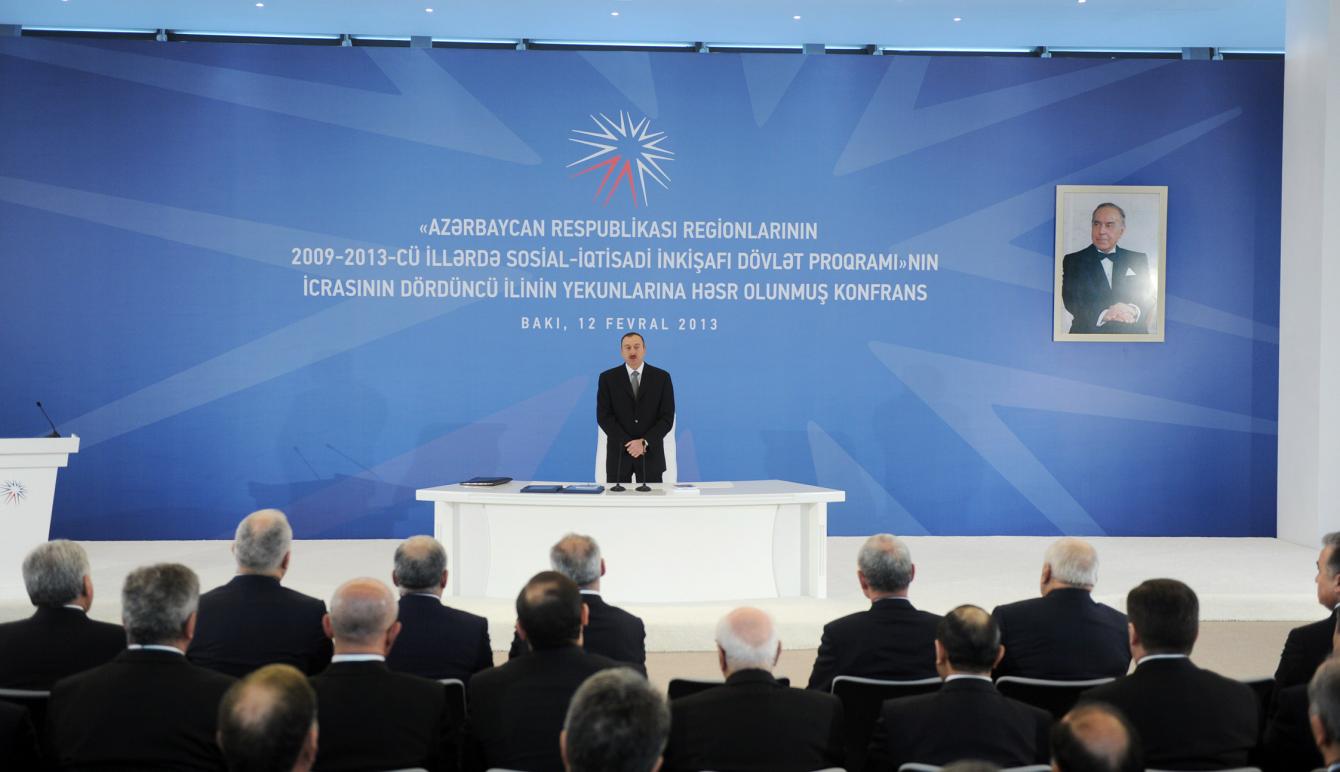
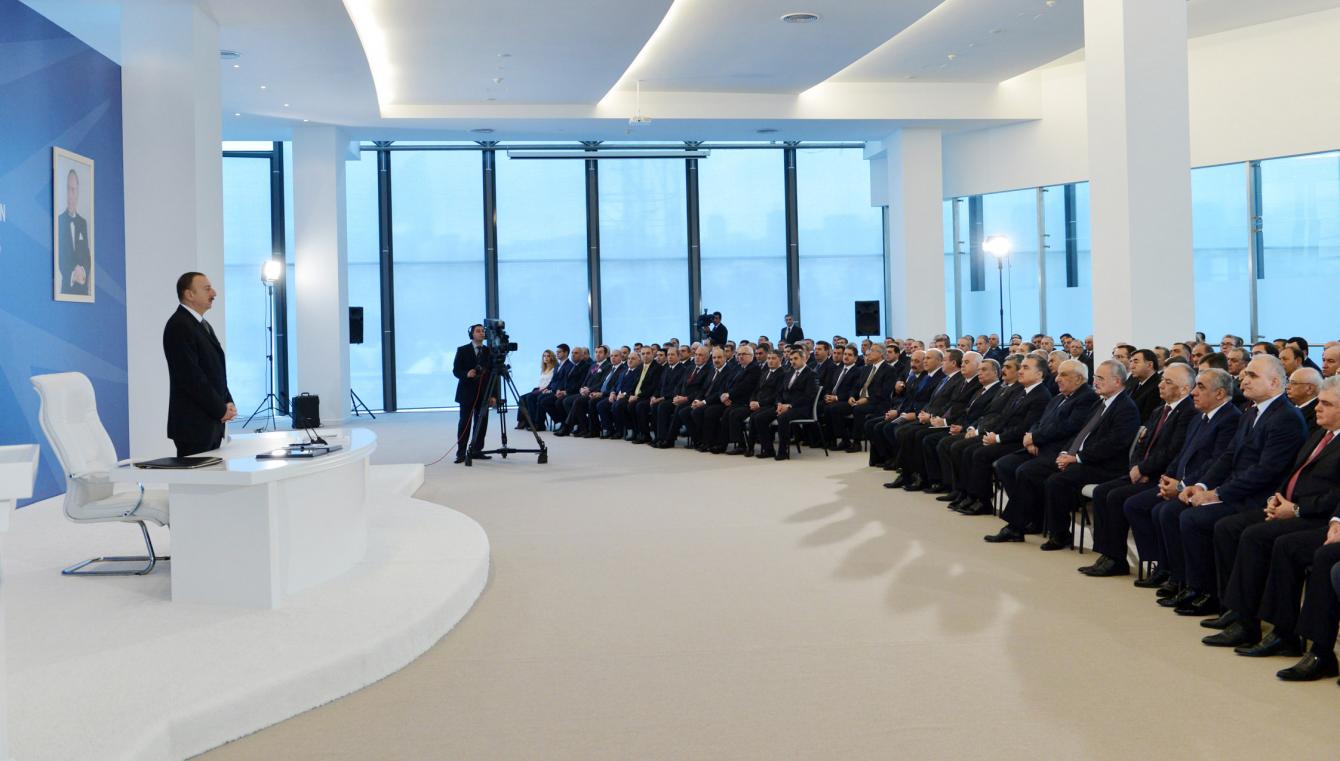
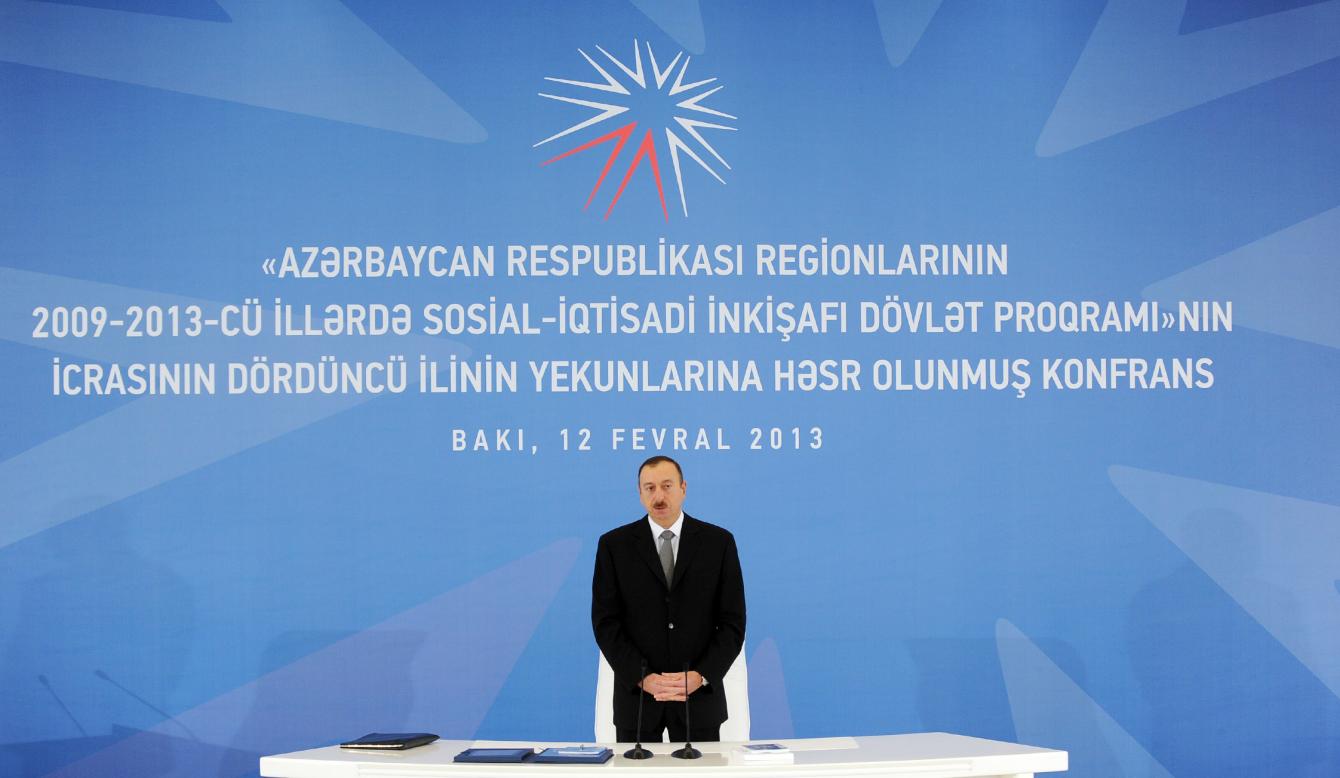
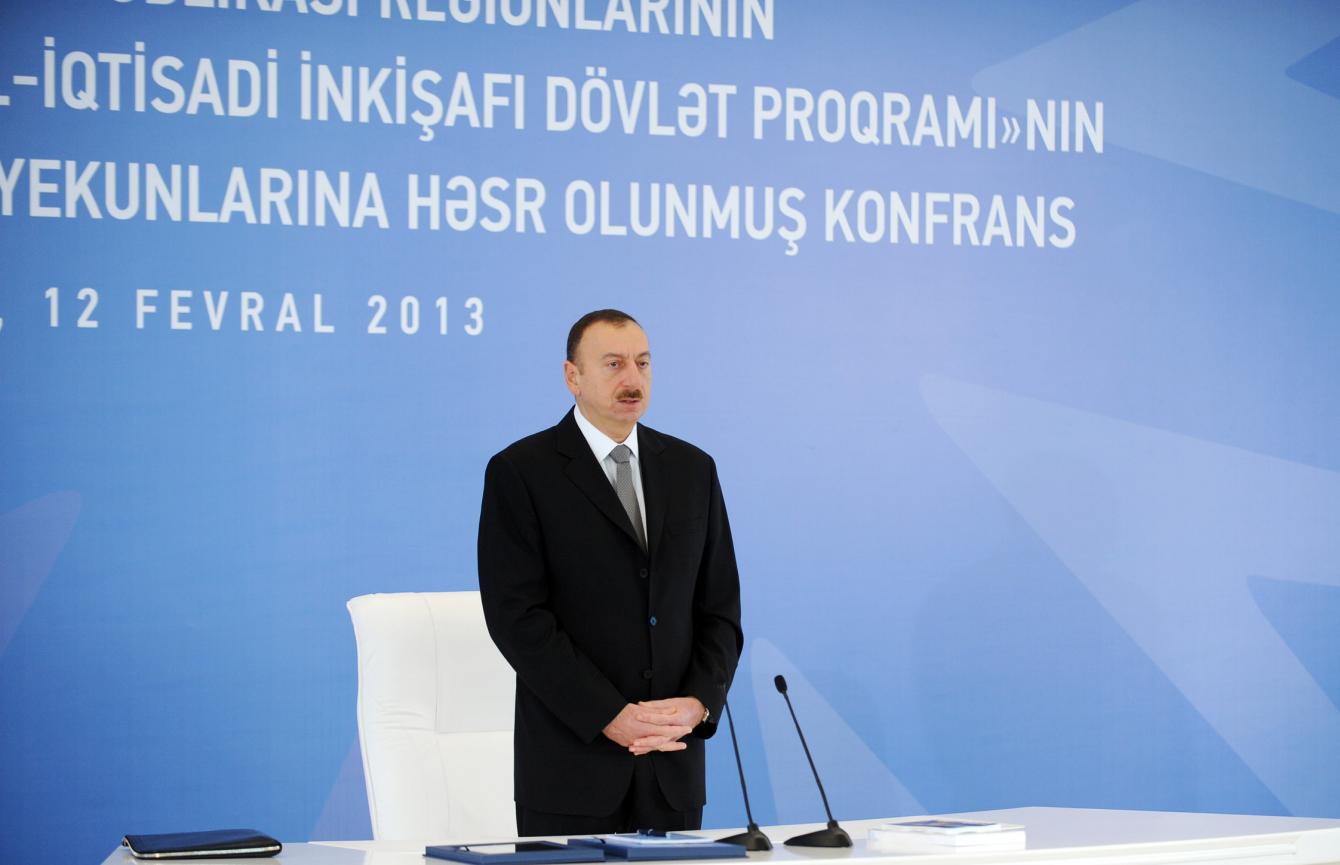
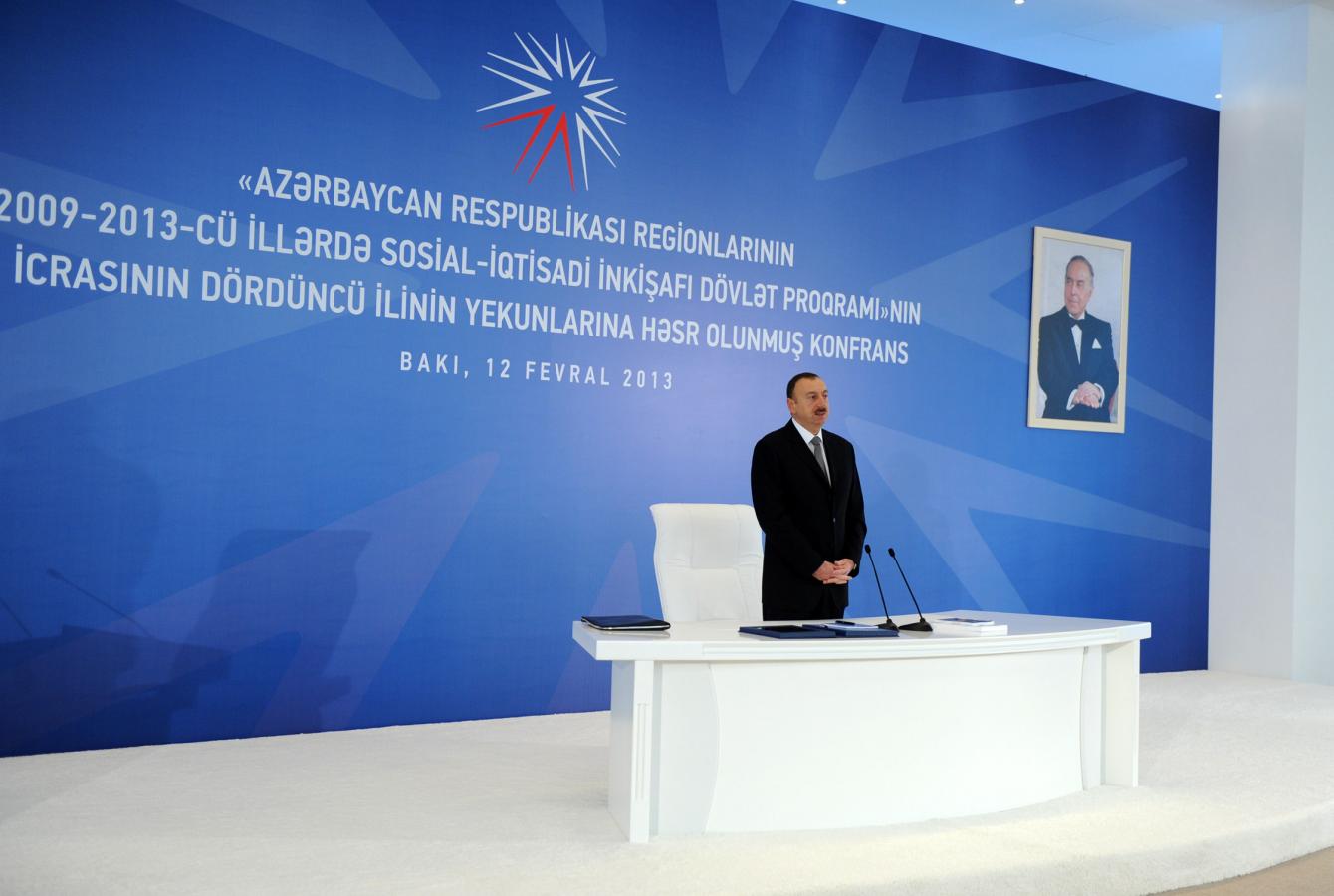
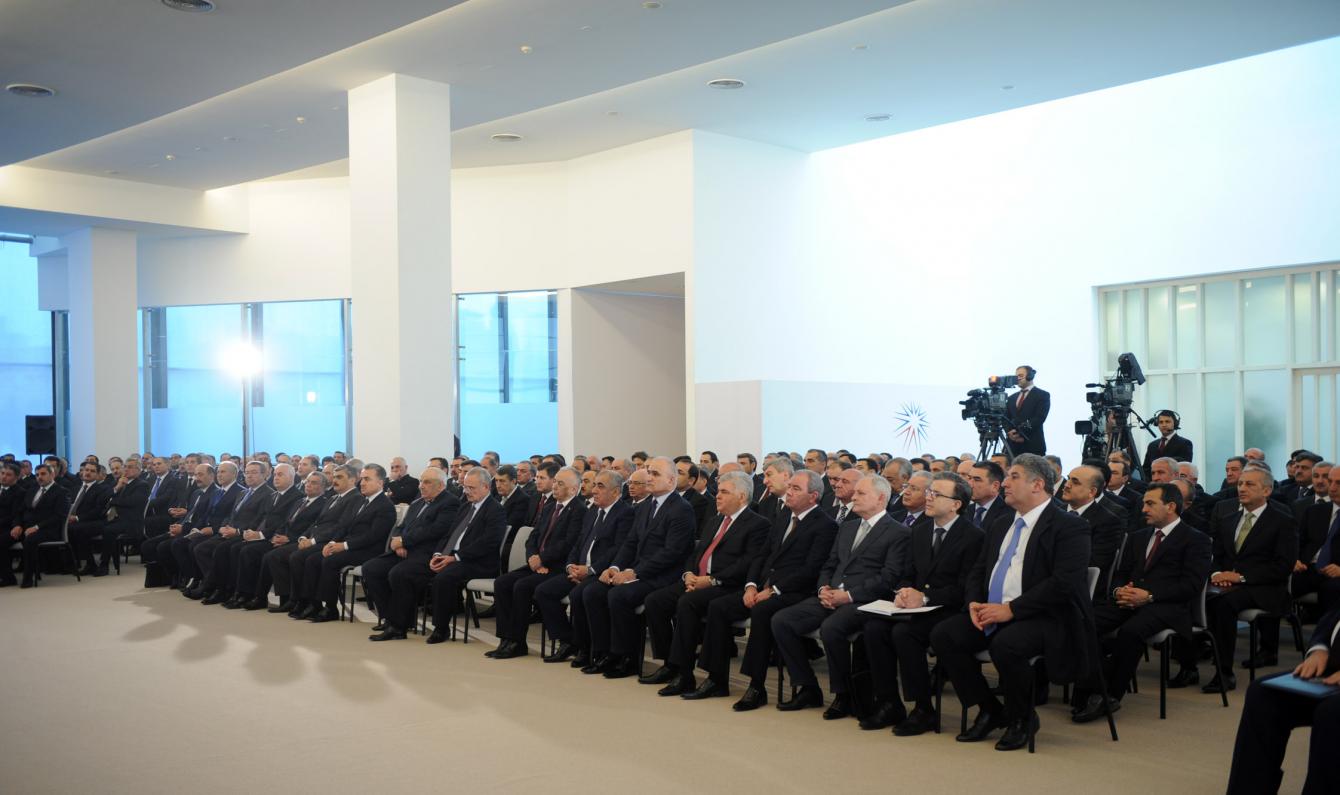
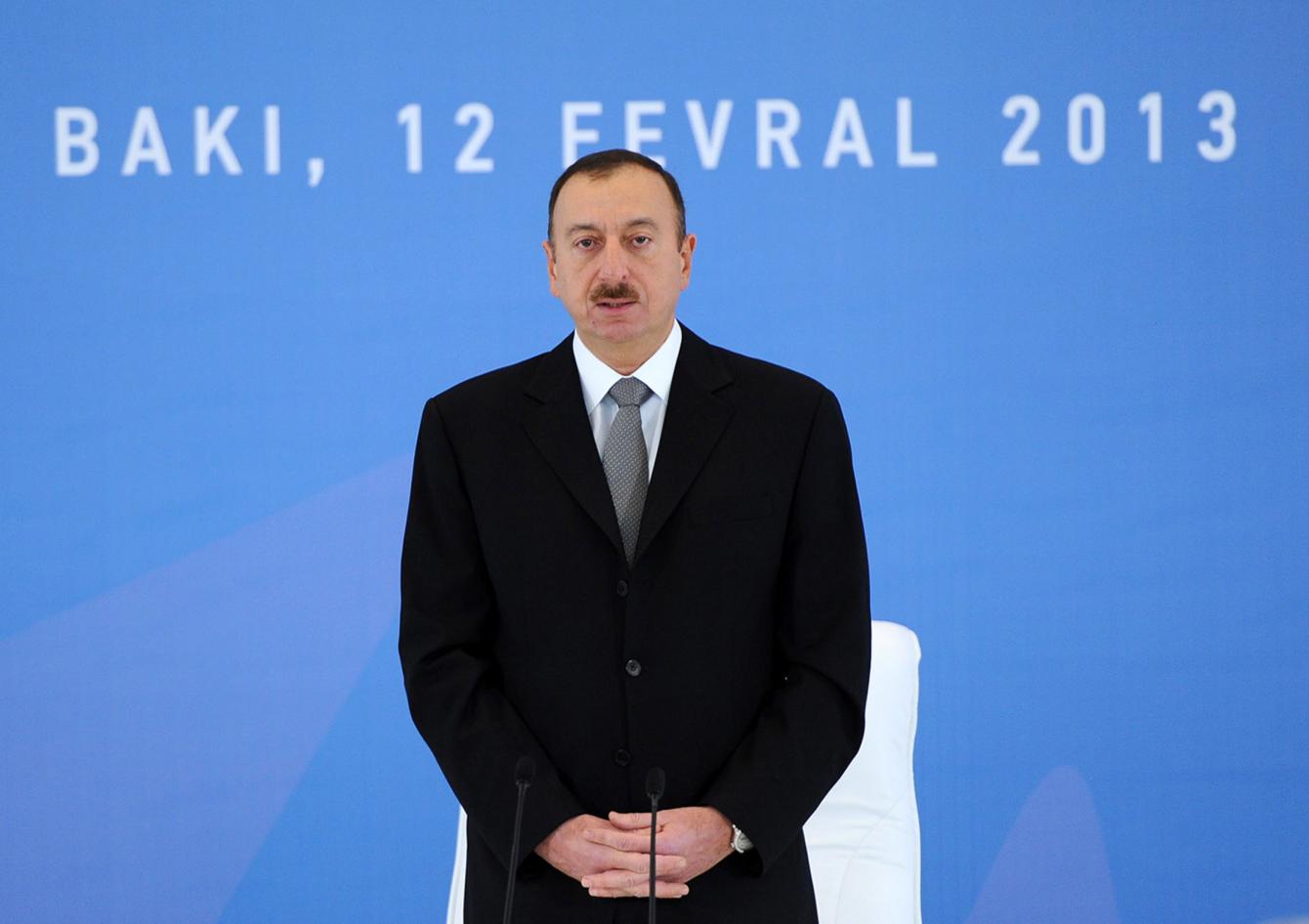
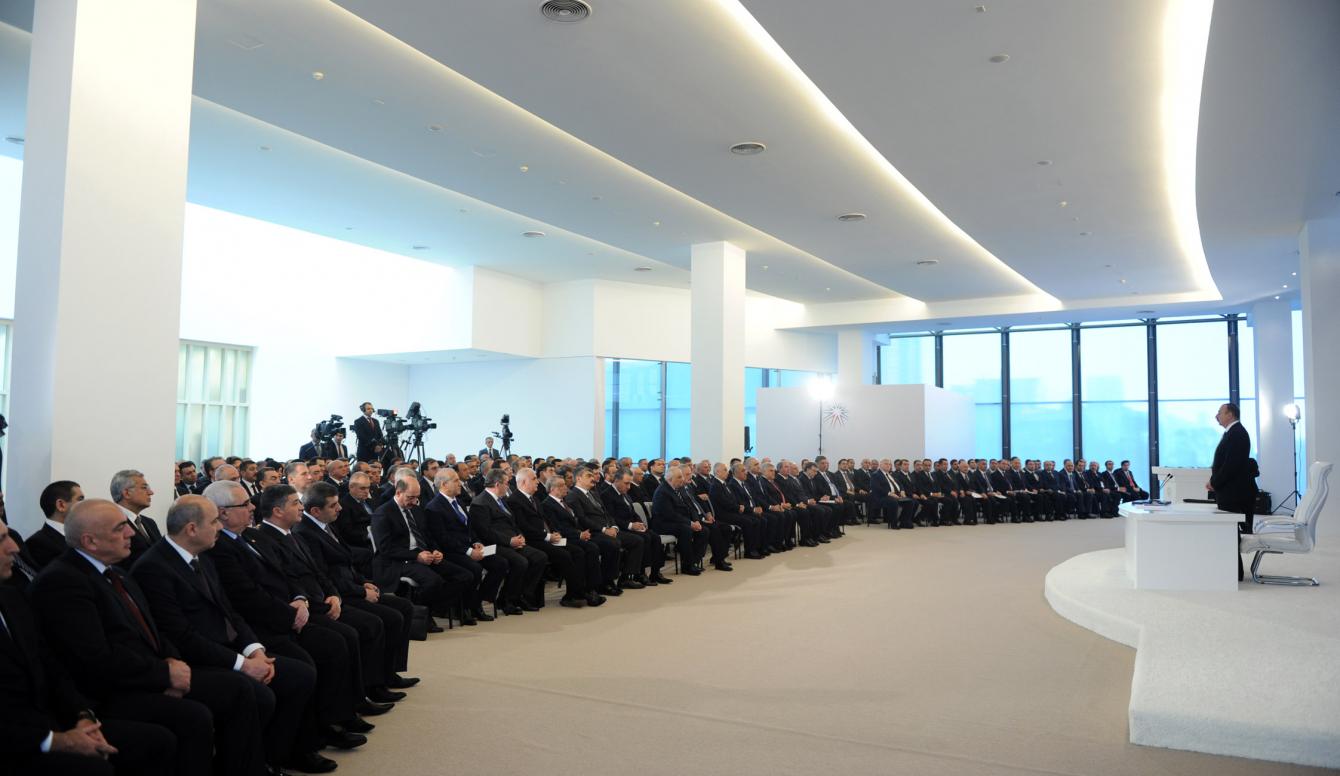
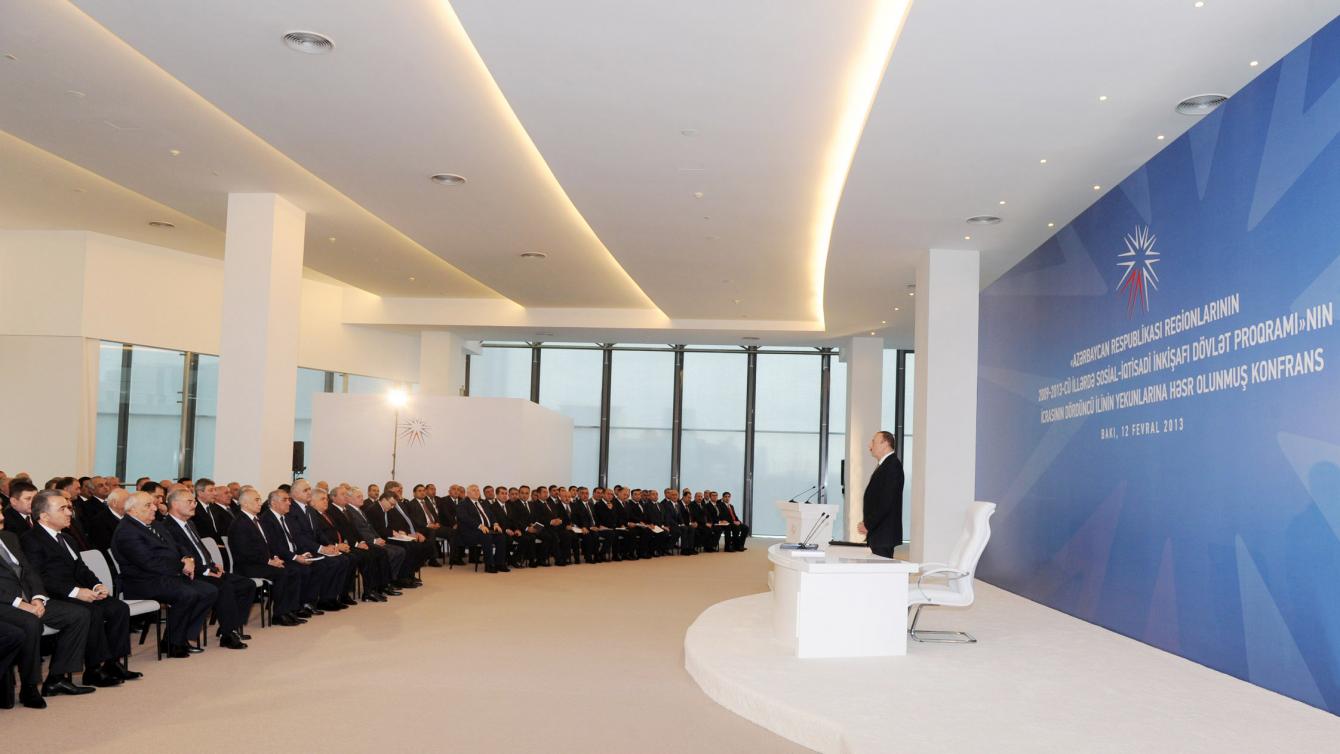
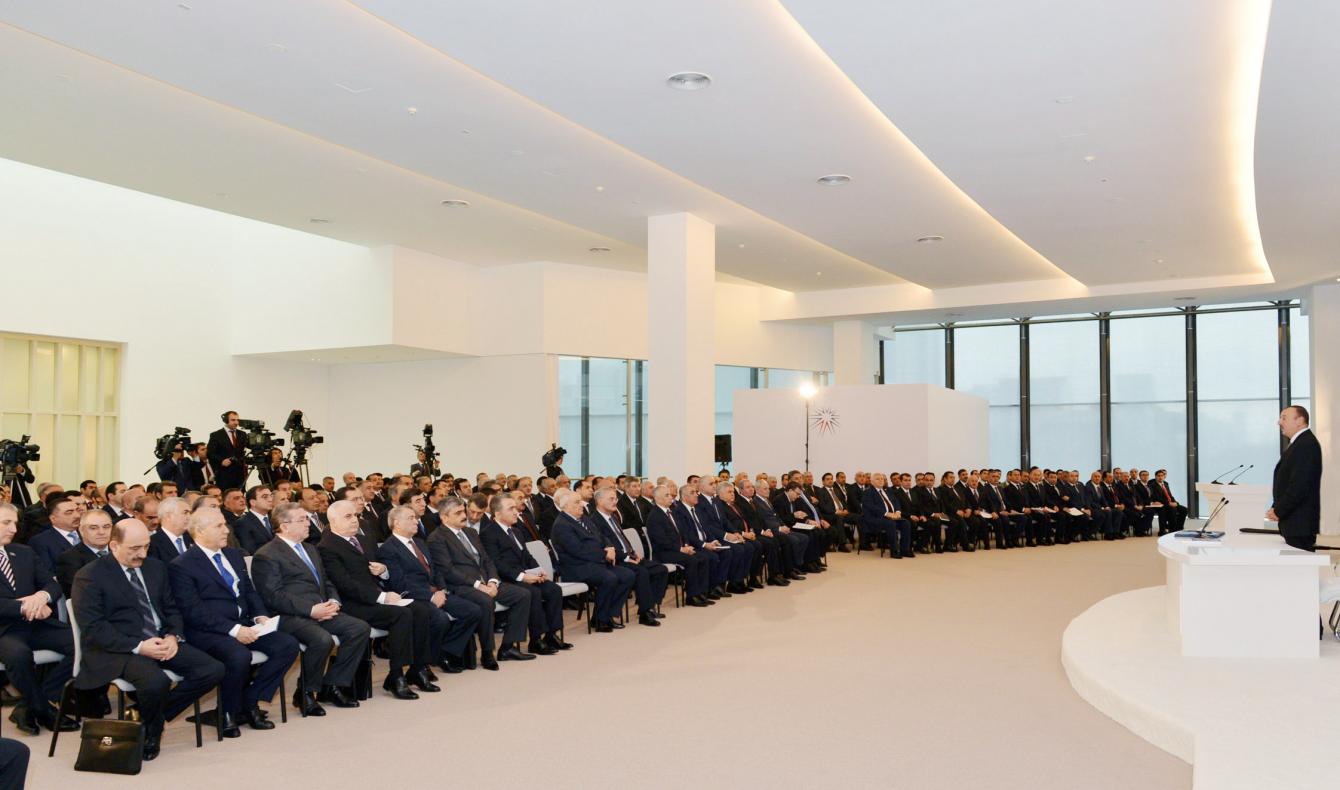
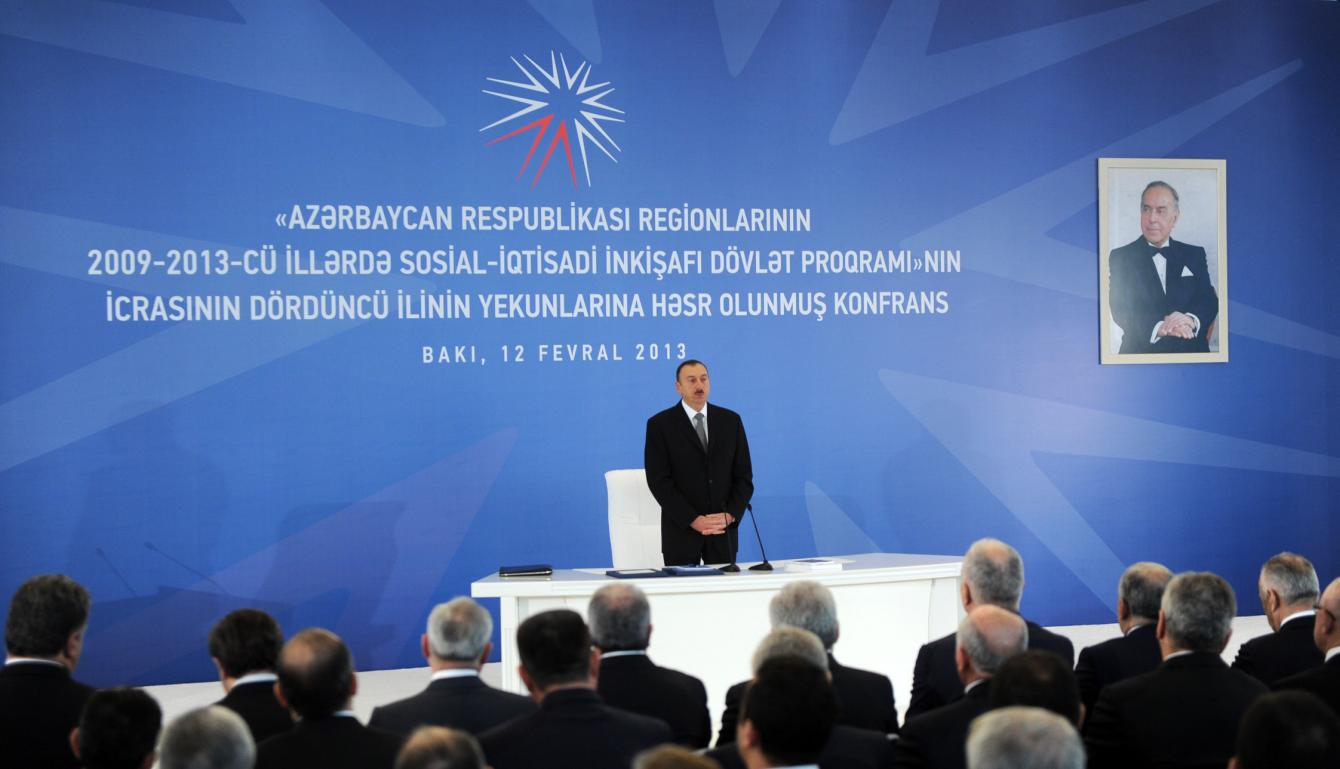
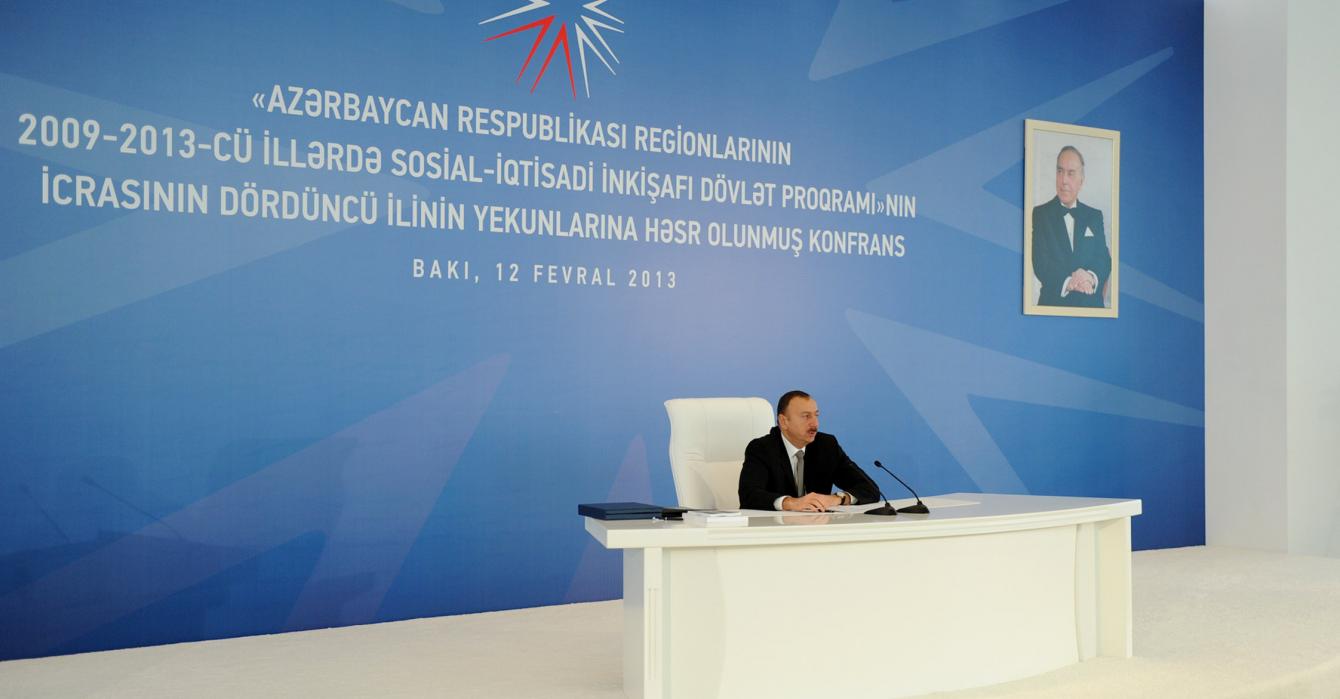
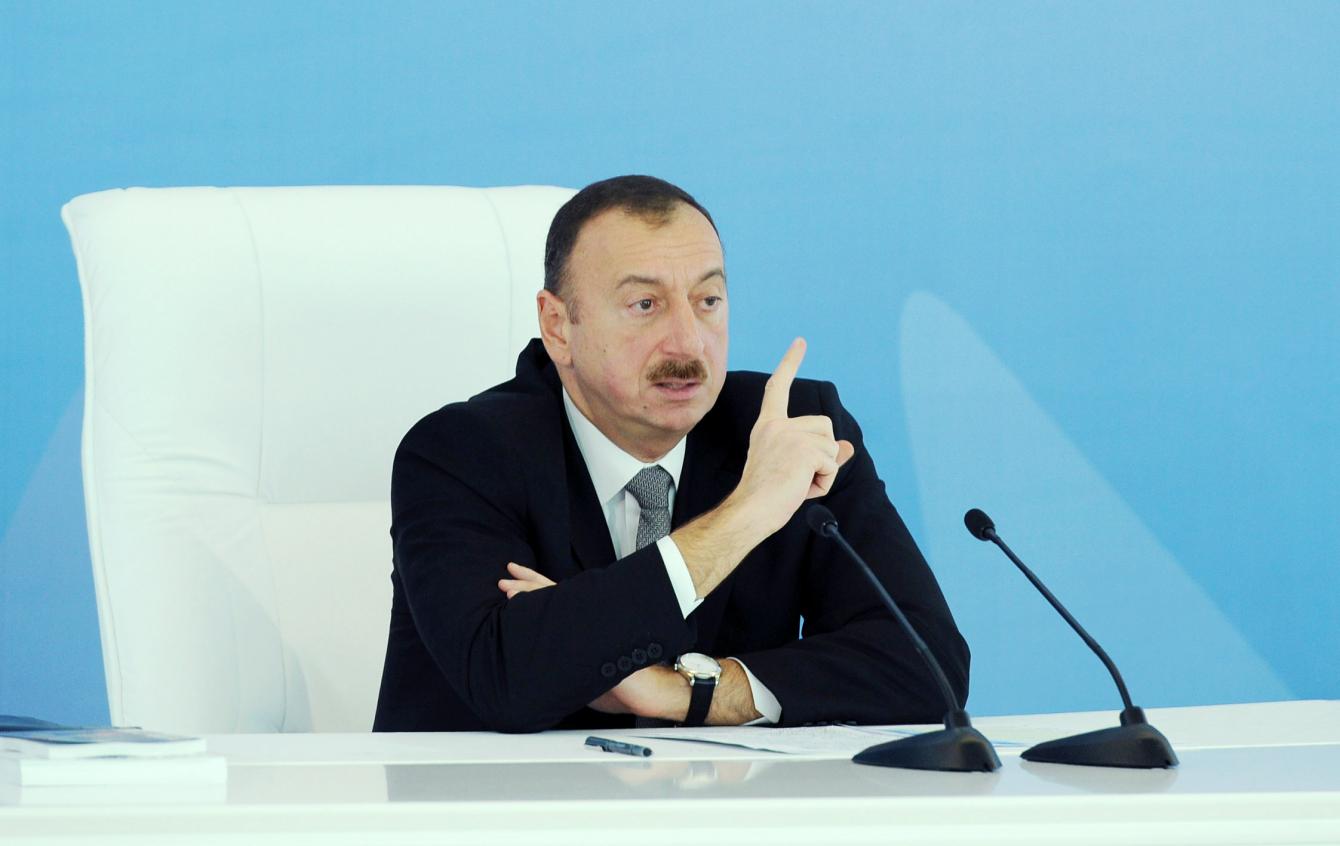
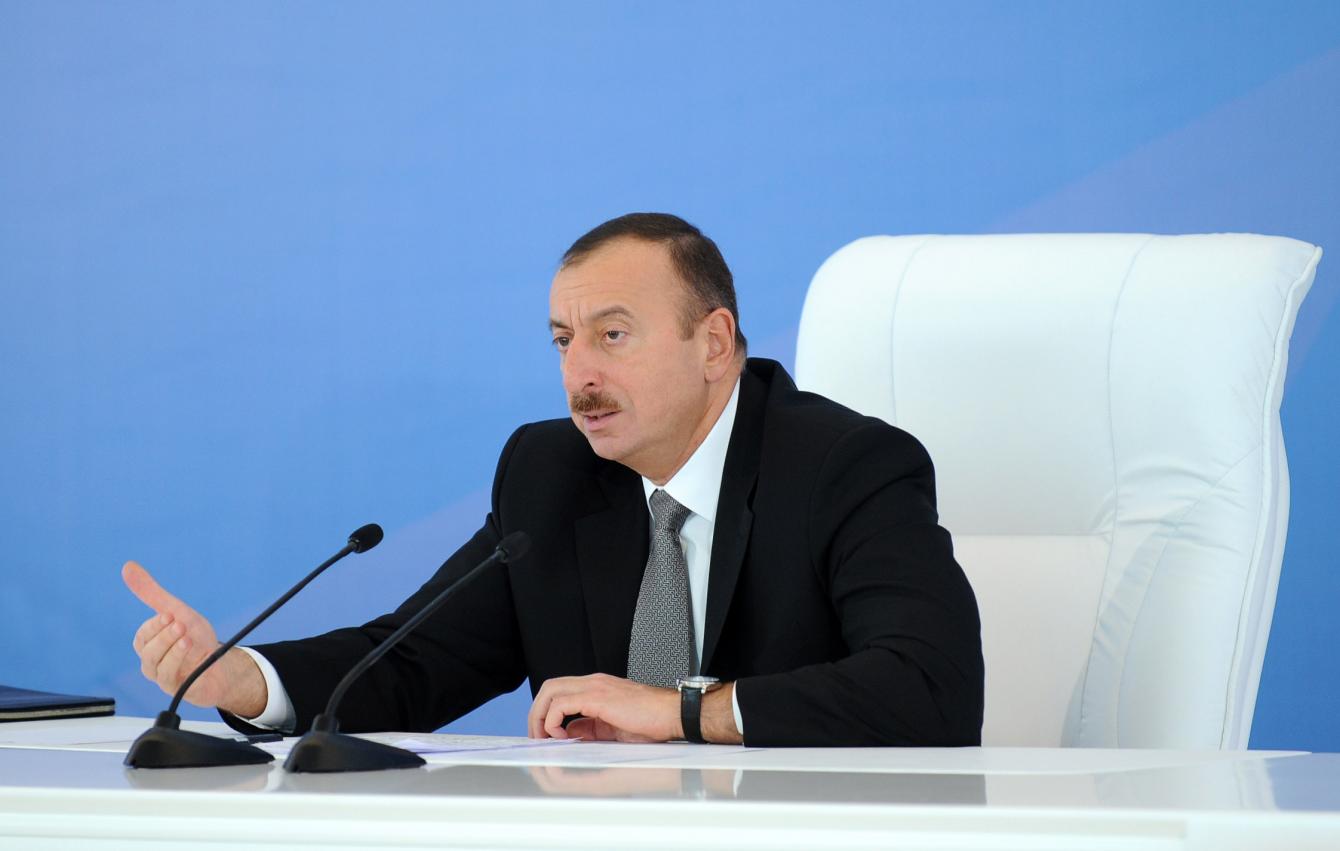

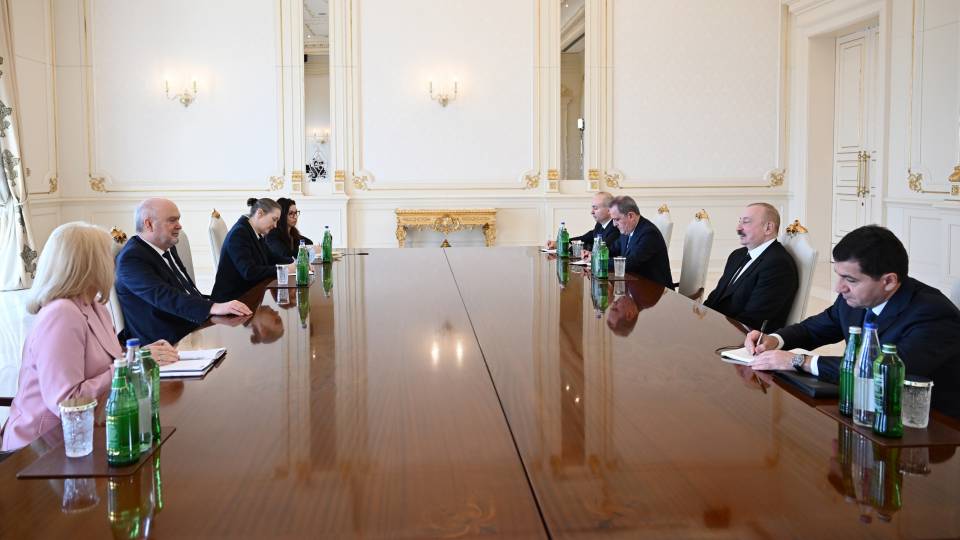
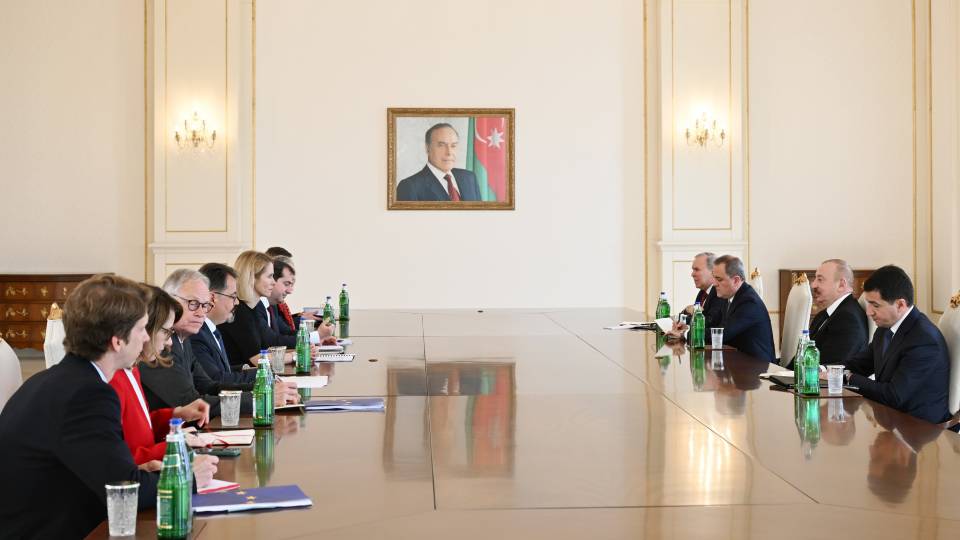
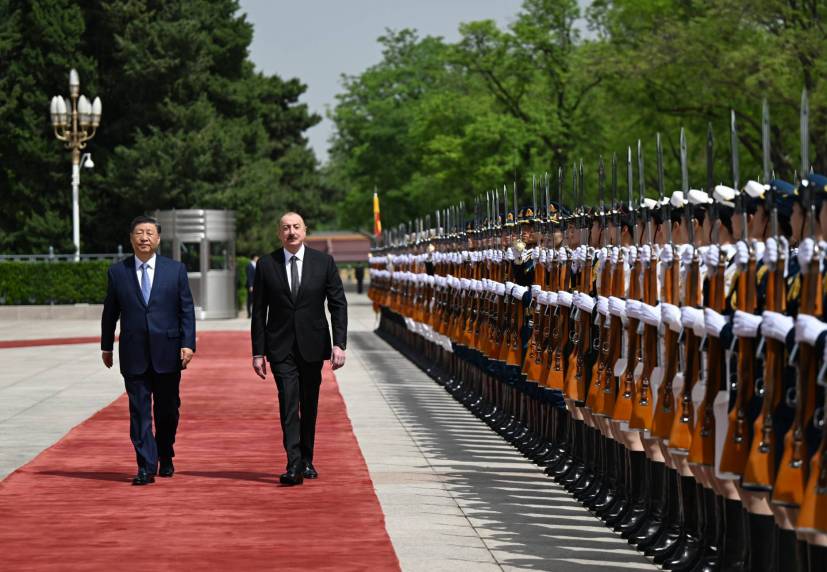
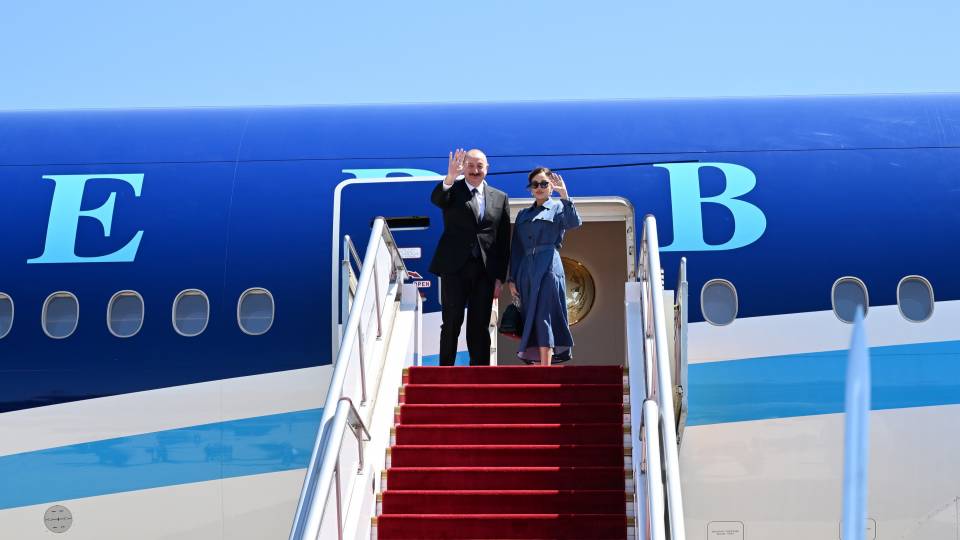
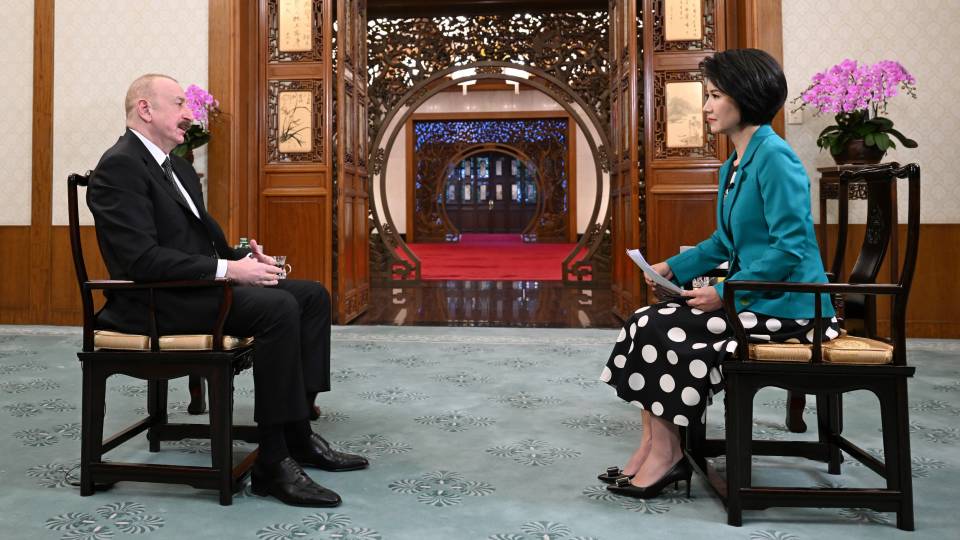
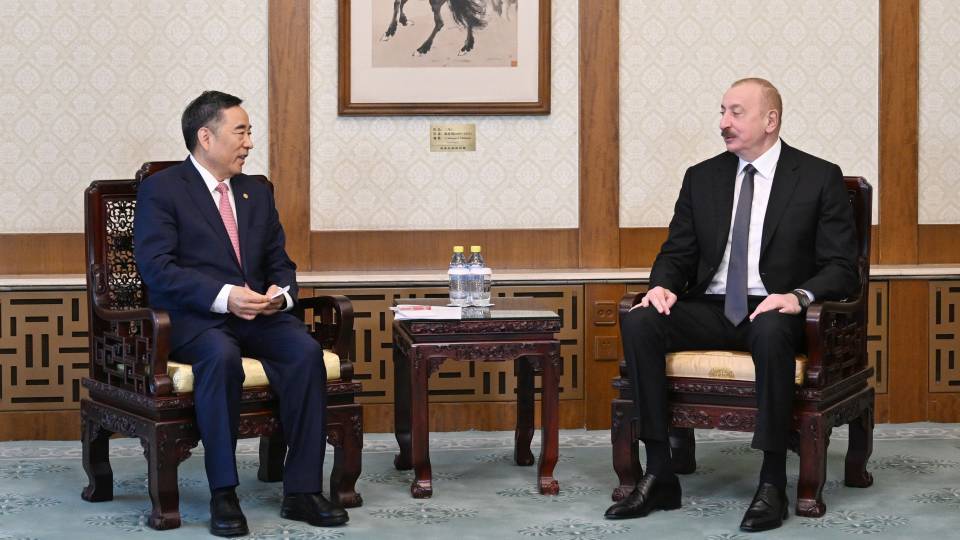
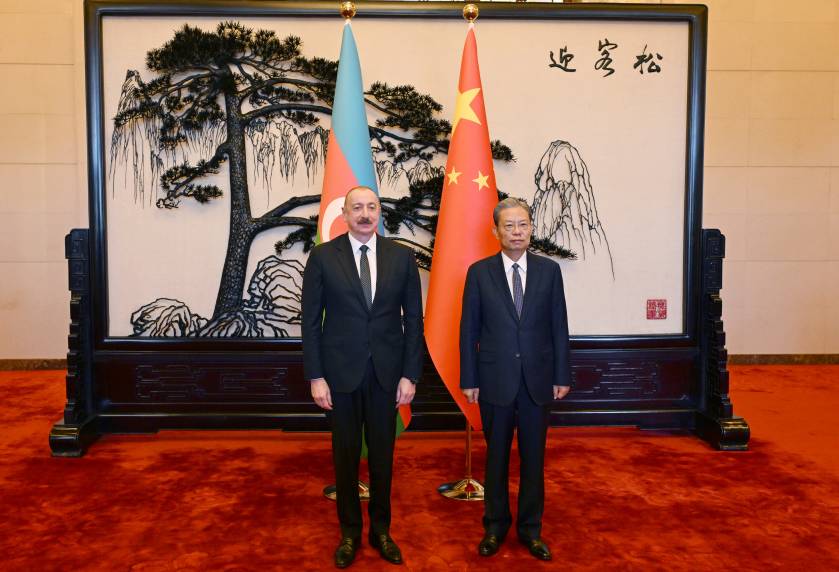
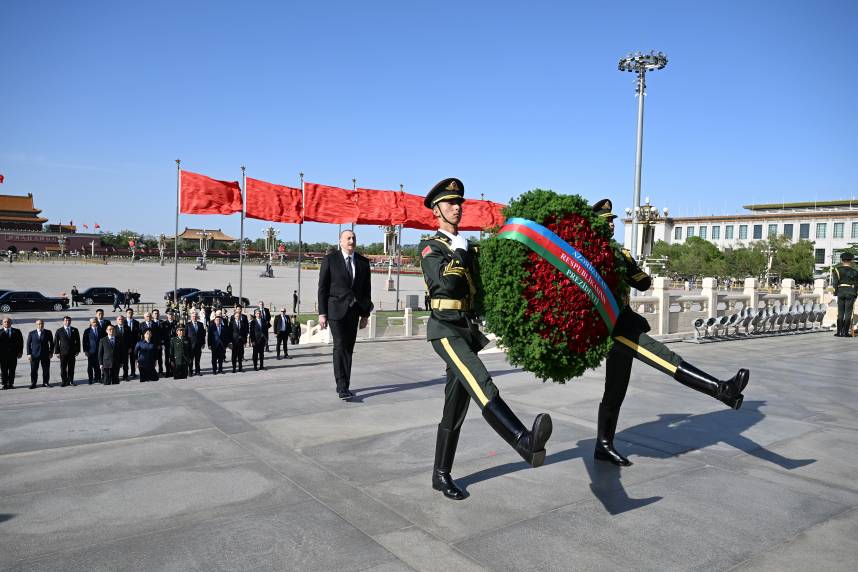
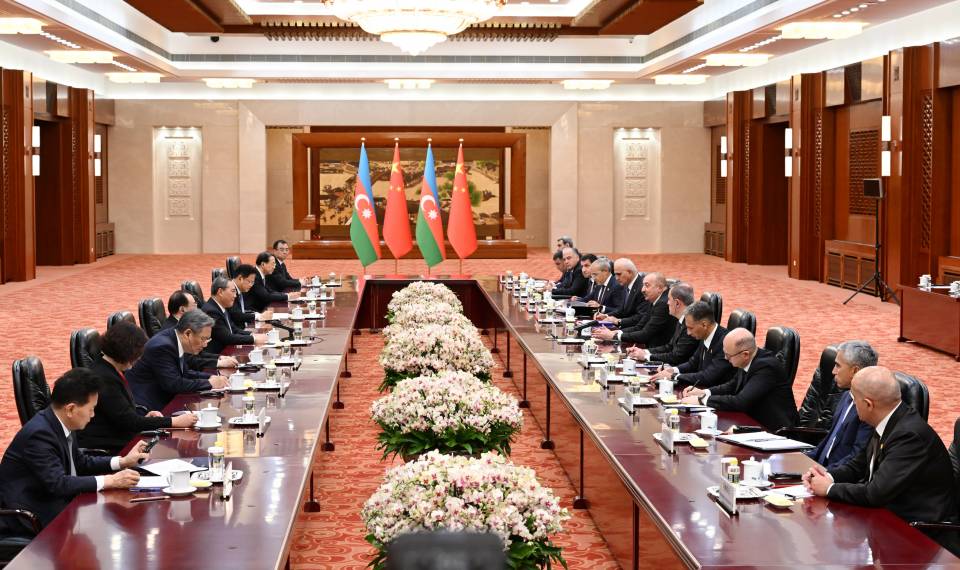
On April 23, President of the People's Republic of China Xi Jinping and First Lady Peng Liyuan hosted an official banquet in Beijing in honor of President of the Republic of Azerbaijan Ilham Aliyev and First Lady Mehriban Aliyeva.
23 April 2025, 12:15The “Joint Statement on the Establishment of a Comprehensive Strategic Partnership between the Republic of Azerbaijan and the People’s Republic of China” was signed in Beijing on April 23 during the state visit of President of the Republic of Azerbaijan Ilham...
23 April 2025, 10:57